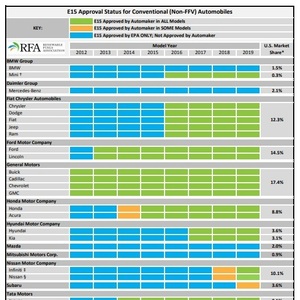Automakers explicitly approve E15 for 93% of new 2019 vehicles

Renewable Fuels Association
October 25, 2018
BY Renewable Fuels Association
More than 93 percent of 2019 model year (MY) vehicles are explicitly approved by the manufacturer to use 15 percent ethanol blends (E15), according to the results of an annual analysis of warranty statements and owner’s manuals conducted by the Renewable Fuels Association. That is up from last year, when approximately 89 percent of MY 2018 vehicles were formally approved by automakers to use E15.
In 2011, the U.S. EPA legally approved the use of E15 in cars and light-duty trucks built in 2001 or later, representing more than 92 percent of all registered cars and trucks on the road today. However, automakers did not start including E15 as an approved fuel in owner’s manuals and warranty statements until 2012, the year E15 was first sold commercially.
For the first time, Subaru is approving the use of E15 in several of its most popular models for MY 2019, including the Ascent, Crosstrek and Impreza. Other highlights of the RFA analysis include:
- General Motors, the first automaker to approve the use of E15, is listing E15 as an approved fuel for its vehicles for the eighth straight model year.
- MY 2019 will be the seventh straight year that Ford has listed E15 as an approved fuel.
Advertisement
- After approving the use of E15 in some models in MY 2018, Nissan is approving E15 for all MY 2019 models. The Infiniti QX80 is the only non-flex fuel model in the Nissan/Infiniti family still lacking E15 approval.
- Hyundai has approved E15 for its MY 2019 Sonata, which was the one model not listed for E15 in MY 2018.
- Mini approves the use of up to 25 percent ethanol (E25) in all MY 2019 models.
- Mercedes-Benz and Mazda are the two largest auto lines that do not yet include E15 as an approved fuel, each accounting for about 2 percent of the market. However, some Mercedes models are available as flex fuel vehicles.
Advertisement
- BMW, Volvo, and Mitsubishi are the only other remaining laggards amongst major automakers.
“As this analysis shows, virtually all new vehicles are clearly approved by the manufacturer to use E15, a cleaner and cheaper fuel blend that is available today at more than 1,400 stations in 29 states,” said RFA President and CEO Geoff Cooper. “While ethanol opponents continue to spread false and misleading information about E15, American drivers deserve to know the truth—nine out of 10 vehicles on the road today are legally approved by EPA to use E15, and 28 of the 32 vehicle lines reviewed in this analysis carry the manufacturer’s approval of E15,” he said.
“We applaud Subaru for approving E15 in many of its new models for the first time, and we will continue to work with the few remaining automakers who do not yet list E15 as an approved fuel,” Cooper added.
The RFA analysis is available here.
Related Stories
U.S. fuel ethanol capacity fell slightly in April, while biodiesel and renewable diesel capacity held steady, according to data released by the U.S. EIA on June 30. Feedstock consumption was down when compared to the previous month.
XCF Global Inc. on July 8 provided a production update on its flagship New Rise Reno facility, underscoring that the plant has successfully produced SAF, renewable diesel, and renewable naphtha during its initial ramp-up.
The U.S. EPA on July 8 hosted virtual public hearing to gather input on the agency’s recently released proposed rule to set 2026 and 2027 RFS RVOs. Members of the biofuel industry were among those to offer testimony during the event.
The USDA’s Risk Management Agency is implementing multiple changes to the Camelina pilot insurance program for the 2026 and succeeding crop years. The changes will expand coverage options and provide greater flexibility for producers.
EcoCeres Inc. has signed a multi-year agreement to supply British Airways with sustainable aviation fuel (SAF). The fuel will be produced from 100% waste-based biomass feedstock, such as used cooking oil (UCO).
Upcoming Events










